 For several weeks around Princeton, you may have seen a sign like this, encouraging participation in the latest survey for the Master Plan. It had been mentioned weekly in the Princeton Municipal Newsletter, in the weekly update from Princeton Public Library, it was on counters at downtown retail checkout areas, even included in informational emails from local religious institutions. It is fair to say it was unlikely that you hadn’t seen some sort of request from Princeton to take a survey about the Community Master Plan. Yet many may still be left wondering what a Master Plan is, what role they have in it and what it means for Princeton.
For several weeks around Princeton, you may have seen a sign like this, encouraging participation in the latest survey for the Master Plan. It had been mentioned weekly in the Princeton Municipal Newsletter, in the weekly update from Princeton Public Library, it was on counters at downtown retail checkout areas, even included in informational emails from local religious institutions. It is fair to say it was unlikely that you hadn’t seen some sort of request from Princeton to take a survey about the Community Master Plan. Yet many may still be left wondering what a Master Plan is, what role they have in it and what it means for Princeton.
What is a Master Plan?
For simplicity purposes, let’s compare the Master Plan to a travel map. Today, most people have Waze, Google or Apple Maps. You get in your car, plug in the address for where you are headed, and instantly get turn-by-turn directions loaded to the screen. Sadly, the technology for mapping out the future plans of a municipality isn’t quite as advanced as that on your iPhone. Rather, it’s a bit more like the “olden days” when AAA helped you research the location you were headed to, included options for where you could bike or walk instead of drive, get gas, even figuring out some fun stops along the way and printed you a AAA TripTik to help you get there (this is available on your phone now, too!). This literal roadmap ensures that you don’t miss anything, providing overall guidance with a clear plan of where you are headed and what you need to do to arrive.
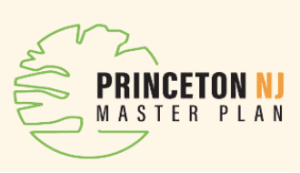 According to the Princeton Community Master Plan website, “a Master Plan is a long-range document that guides a community’s growth and development, taking into account its unique challenges and opportunities.” It includes details such as how the community wants certain areas to develop (the same or differently), zoning expectations for different locations and neighborhoods, ideas about travel (roadways, bike lanes, etc.), preservation (open space), public uses (within parks and other areas), and additional theoretical and technical ideas.
According to the Princeton Community Master Plan website, “a Master Plan is a long-range document that guides a community’s growth and development, taking into account its unique challenges and opportunities.” It includes details such as how the community wants certain areas to develop (the same or differently), zoning expectations for different locations and neighborhoods, ideas about travel (roadways, bike lanes, etc.), preservation (open space), public uses (within parks and other areas), and additional theoretical and technical ideas.
Per New Jersey law, every municipality must have one. Princeton has decided that in order to properly map out its path for the next 10 years, it must heavily weigh community input. Two surveys have been put out so far to local residents, to gather feedback that will help direct the Master Plan rewrite that is underway. The first went out over the summer on economic growth (the Princeton Consumer Survey) and the second, as seen above, just closed last week and was about the community vision. There was also a Princeton University Student Consumer Survey. To some, it appears the Master Plan is a compilation of people’s hopes and dreams for the future, and in some ways it is. But it is intended to provide specific guidance on local decisions to allow the town to get there, and technically falls under the authority of the Planning Board, which mainly follows zoning codes around town.
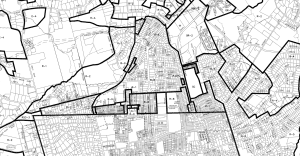 “It’s more than just land use because it is tied into so many things,” shares Justin Lesko, Princeton’s Acting Planning Director/Senior Planner. “Even if you’re not interested in planning this legal document, you still can be interested in taking part and contributing to it because it touches upon open space, recreation, how we get around, cars, e-bikes, mass transit, historic presentation, green building and sustainability, etc. It’s not just something I am going to type up that is going to sit on a shelf and never gets looked at.”
“It’s more than just land use because it is tied into so many things,” shares Justin Lesko, Princeton’s Acting Planning Director/Senior Planner. “Even if you’re not interested in planning this legal document, you still can be interested in taking part and contributing to it because it touches upon open space, recreation, how we get around, cars, e-bikes, mass transit, historic presentation, green building and sustainability, etc. It’s not just something I am going to type up that is going to sit on a shelf and never gets looked at.”
Being able to read, understand and utilize the Master Plan better enables the Zoning Board to ensure that permits granted to new buildings are in line with what the town wants in that area, and that when Council creates new ordinances, they have guidance based on input from many factions of the community.
“The Master Plan will inform decision-makers on Princeton’s attitudes about how it wants to grow. The decision-makers include the appointed members of the Planning Board and Zoning Board of Adjustment, who decide whether land-use applications conform to community values and attitudes as articulated in the Master Plan; and Mayor and Council, who make policy decisions and adopt zoning ordinances, which are informed by the Master Plan,” explains Tim Quinn, who chairs the Planning Board’s Master Plan Subcommittee, is Planning Board Vice Chair and ex-officio member of the Master Plan Steering Committee.
New Jersey Municipal Land Use Law requires that the Master Plan is reexamined and adopted every ten years. Princeton last did a complete overhaul in 1996. It did make updates to elements of the plan in 2001, 2007, 2017 and 2020 (the Housing and Green Building and Sustainability elements adopted that year will be incorporated into the new plan).
Why is the Master Plan important?
“It’s like getting in your car and looking at a map from 30 years ago. Would you use that map and try to take a trip and go somewhere?” questioned Councilwoman Mia Sacks, Planning Board member and Council Liaison to the Master Plan Steering Committee.
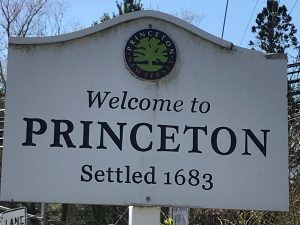 Unfortunately, the Princeton government has been utilizing an outdated “map” for far too many years. Though there were some updates made since 1996, the essential community input remains and must be reworked to address what is needed and wanted today.
Unfortunately, the Princeton government has been utilizing an outdated “map” for far too many years. Though there were some updates made since 1996, the essential community input remains and must be reworked to address what is needed and wanted today.
“The town’s current Master Plan was so out of date that it had become a relic of where we’ve been, rather than a roadmap of where we want to go. With all the outdated, excess, extraneous material, it had become difficult to navigate the existing plan, let alone to comprehend!” explains Councilwoman Sacks with Councilman David Cohen, Planning Board member and member of the Master Plan Subcommittee. “Creating a streamlined, organized, highly readable document that the average lay person can easily access is a top priority.”
At the end of October, a Mercer County Superior Court judge overturned an approved townhouse development intended on Humbert Street, citing that the variances granted by Princeton’s Planning Board would change the character of the area as it is intended in the zoning ordinance. Maybe the current ordinance is consistent with the community’s desires for that area, and it shouldn’t be home to townhouses. Or perhaps an updated Master plan will show a desire to change the zoning provisions, allowing the buildings? This is just one such example of how zoning plans guide what can be done on specific properties.
“When Zoning regulations more accurately reflect the current built reality of an area of town, neighborhood visioning and land use review go much more smoothly. A major focus of the Master Plan is to identify critical areas where this sort of correction is needed,” Sacks and Cohen add. “The Witherspoon-Jackson neighborhood (WJN), where most of the existing structures are nonconforming, is a prime example. Until corrective action is taken, it will remain more expensive and cumbersome for the current residents of the WJN to make even the smallest modifications or additions to their houses.”
How is the new Master Plan getting created?
The re-examined Master Plan officially falls under the helm of the Planning Board who will ultimately vote on the final plan. Within this board falls the Master Plan Subcommittee, which was first tasked with hiring contractors to help craft the document – JGSC Group helped with economic development, Susan G Blickstein, LLC with community engagement and Clarke Caton Hintz (CCH) which is guiding the process and ultimately drafts the new Master Plan. These processes are all to take place with guidance from the Master Plan Steering Committee, a 13-member group comprised of stakeholders across the community.
“The Steering Committee members have been selected specifically with an eye toward representing a wide range of stakeholder and interest groups, to ensure that no single point of view is disproportionately favored in the process,” explain Sacks and Cohen.
The Steering Committee also serves to ensure that things move along, with monthly meetings (open to the public via Zoom or through YouTube recordings) created to guide the process and not manage the content.
Interestingly, though Council will be implementing and using it as a guide when creating certain policies and ordinances, Council does not have to approve the updated Master Plan. Two Council members, Sacks and Cohen, sit on the Planning Board (and subsequently are part of the Steering Committee), and Mayor Mark Freda is also a member of the Steering Committee. Yet, no specific guidance is being given towards the new plan from the sitting officials beyond the opportunities granted to everyone in the community.
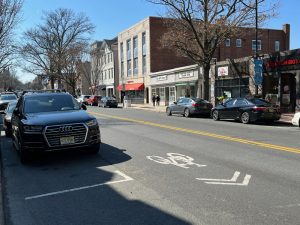 So, who is contributing most to the direction of the new Master Plan? You! Every effort is being made to ensure that anyone that wants to share their thoughts, concerns and desires, has a chance to do so. In addition to the opportunity to attend Steering Committee meetings, locals have and will be invited to take part in community surveys and are requested at open houses (the first of which will be at Princeton Public Library November 30th from 4-7pm).
So, who is contributing most to the direction of the new Master Plan? You! Every effort is being made to ensure that anyone that wants to share their thoughts, concerns and desires, has a chance to do so. In addition to the opportunity to attend Steering Committee meetings, locals have and will be invited to take part in community surveys and are requested at open houses (the first of which will be at Princeton Public Library November 30th from 4-7pm).
The first community survey, put out this summer, received approximately 4,000 responses with about 75% from Princeton residents. This amounts to approximately 10% of the local population taking part. For the most recent community survey, despite intense outreach, preliminary results indicate there were 896 responses. 88% of the respondents said they lived in Princeton (less than 3% of the population). Is this enough input to go on?
“We will want to know that survey responses came from every geographic area; from people of various ages, ethnicities and gender identities; from old-timers and newcomers; people in different types of housing, with a variety of income levels, etc. That data will tell us if the survey successfully reached a broad cross-section of Princeton,” says Louise Wilson, Princeton Planning Board chair and member of the Master Plan Steering Committee, further adding that the Steering Committee will explore these demographics.
Is the necessary input being received?
Still, some residents wonder how much of their feedback is going to translate into the new Master Plan.
“We love it here and love being near the university campus, but I don’t feel they’re being upfront with what’s going on. The survey is way too long and very vague. Can they actually bring in more pizza restaurants than coffee shops? People go to landlords, not the town,” resident Jessica Vieira poses to Princeton Perspectives. “We currently have zoning plans in place that they’re not adhering to. They took down the historic Tennent Roberts Whiteley Buildings at the Princeton Seminary and I’m pretty sure that’s not zoned for multi-family housing. It’s dormitory living, very different than it will be with people with cars in dwellings.”
Those involved hope the new Master Plan will ease this type of concern, for with current and modern desires better outlined, the decisions made by municipal officials and boards shouldn’t conflict with what’s in the books. As for transparency, some say those guiding the Master Plan are being as open as possible – with all public meetings and a triumphant effort to gather community feedback.
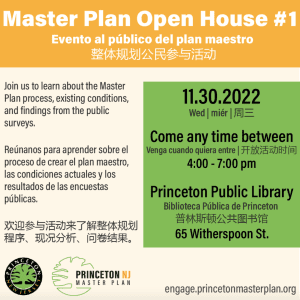 “Get involved. If you didn’t get a chance to fill out the first or second surveys, please come to the Nov. 30 Open House at Princeton Public Library. There will be a third survey building off the results of the Visioning Survey (the second survey, which closed Nov. 6). It is very important that every voice to be heard because this plan will shape what our town will become,” Quinn notes.
“Get involved. If you didn’t get a chance to fill out the first or second surveys, please come to the Nov. 30 Open House at Princeton Public Library. There will be a third survey building off the results of the Visioning Survey (the second survey, which closed Nov. 6). It is very important that every voice to be heard because this plan will shape what our town will become,” Quinn notes.
In addition, there is hope that beyond the surveys and open houses, additional input gathered from the continued outreach to the community will add to the vision. Lesko and CCH consultants are planning meetings with all Boards, Committees and Commissions, at many community events, with local religious institutions, nonprofit organizations and other groups that have interests and concerns about the Master Plan. And they request that anyone else that wants a meeting reach out to arrange one. Once this data is compiled, organizers will move onto the next steps.
How does the Master Plan move forward?
“This winter, the consultant team will synthesize what we’ve heard and learned and begin to form outlines of updated Master Plan ‘elements’ to present to the Steering Committee,” lays out Wilson. “In the first quarter of next year, there will be a third community survey based on findings to date, and another in-person Open House. We also expect to host a virtual Open House in early 2023. The updated plan elements will be vetted and refined in the spring, and we hope and expect the Planning Board will adopt the updated Master Plan next summer after final, formal public hearings before the Board.”
It is important to note that Master Plans come together differently in different towns. Some are created by the elected officials or municipal staff. Though Lesko, a municipal employee, is overseeing things and there are representatives from these groups on Princeton’s Planning Board and the Steering Committee, the process here is mainly lay led. The plan is also being guided by CCH, which has worked with many municipalities including Hamilton, Lawrence and created Master Plans for Wildwood, Moorestown, Asbury Park and others around NJ.
“The key to having a good Master Plan consultant is that they are able to balance the community’s voice with the technical requirements that staff advises on,” Lesko explains. “That balance is one of the reasons that Clarke Caton Hintz was chosen by the Master Plan subcommittee of the Planning Board as our consultant and CCH has demonstrated that in dozens of communities in NJ.”
The leadership hopes that by next summer Princeton will have compiled its updated Community Master Plan. The timing is tight, with a lot of variables and inputs being considered. Trying to figure out and find the balance of what Princeton is, what people want it to be and leading to that point is the goal of it all.
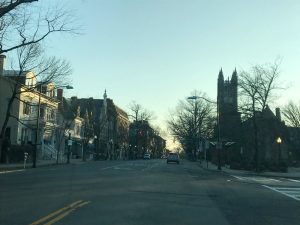 “Some think of it as a college town, which it is, but in a very different way than, say, a Big 10 town. For others, it is a bedroom community for commuters to New York, which it is, but not the way Westchester County or Greenwich, Connecticut, are. Some see it as a small city, which, again, it sort of is and sort of isn’t. Others, particularly some of the people who grew up here or who have been here longer than I have, idealize it as small town, one that was certainly experienced differently if you grew up in Witherspoon Jackson or Jugtown, as opposed to the Western Section. The challenge of this Master Plan is to forge consensus on a way forward out of these multiple and distinctive views of what Princeton is and should become,” Quinn points out.
“Some think of it as a college town, which it is, but in a very different way than, say, a Big 10 town. For others, it is a bedroom community for commuters to New York, which it is, but not the way Westchester County or Greenwich, Connecticut, are. Some see it as a small city, which, again, it sort of is and sort of isn’t. Others, particularly some of the people who grew up here or who have been here longer than I have, idealize it as small town, one that was certainly experienced differently if you grew up in Witherspoon Jackson or Jugtown, as opposed to the Western Section. The challenge of this Master Plan is to forge consensus on a way forward out of these multiple and distinctive views of what Princeton is and should become,” Quinn points out.
It is the hope that by making sure as many voices as possible are involved will make the updated Master Plan more legitimate, easier to follow and a better guide for what the community wants going forward.
To stay on top of what is happening next, find out about open houses, surveys or provide comment at Planning Board meetings, you can always check out engage.princetonmasterplan.org, or register for updates at the bottom of the homepage. Of course, keep reading Princeton Perspectives to learn about any major actions that are taken in the future.
Lisa Jacknow spent years working in national and local news in and around New York City before moving to Princeton. Working as both a TV producer and news reporter, Lisa came to this area to focus on the local news of Mercer County at WZBN-TV. In recent years, she got immersed in the Princeton community by serving leadership roles at local schools in addition to volunteering for other local non-profits. In her free time, Lisa loves to spend time with her family, play tennis, sing and play the piano. A graduate of the S. I. Newhouse School of Public Communications at Syracuse University, Lisa was raised just north of Boston, Massachusetts but has lived in the tri-state area since college. She is excited to be Editor and head writer for Princeton Perspectives!
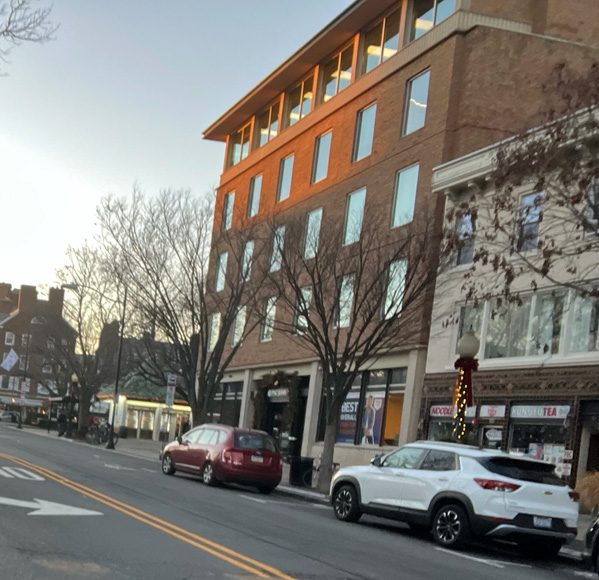 Sunday morning, I was driving through town, south on Nassau Street from Harrison towards 206. It’s very peaceful at that time of day, which allows the beauty of the buildings and layout to really shine. In my normal days of hustle and bustle, there are few moments like that which remind me of the things that make Princeton stand out from other towns.
Sunday morning, I was driving through town, south on Nassau Street from Harrison towards 206. It’s very peaceful at that time of day, which allows the beauty of the buildings and layout to really shine. In my normal days of hustle and bustle, there are few moments like that which remind me of the things that make Princeton stand out from other towns.

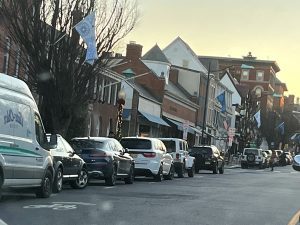 Like a good soup gets its flavor from the ingredients you put into it, a municipality becomes what it is made of – its schools, stores, restaurants and community. Each part has its purpose. In Princeton, the variety of commerce areas offer opportunities for locally owned businesses to add a lot of their unique flavor.
Like a good soup gets its flavor from the ingredients you put into it, a municipality becomes what it is made of – its schools, stores, restaurants and community. Each part has its purpose. In Princeton, the variety of commerce areas offer opportunities for locally owned businesses to add a lot of their unique flavor. “This place reminds me of the show Cheers. Meaning, these are our customers but they’re also our friends and family,” explains Eric Weshner, who owns
“This place reminds me of the show Cheers. Meaning, these are our customers but they’re also our friends and family,” explains Eric Weshner, who owns 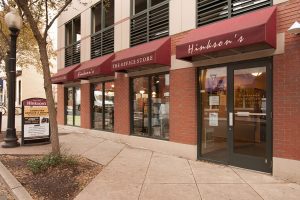 Princeton is also home to Andrew Mangone, who grew up here, working at his uncle’s stationary store on Nassau Street. The store, originally named Roland Stationary, has been around since the mid-1800s. Now, in 2022,
Princeton is also home to Andrew Mangone, who grew up here, working at his uncle’s stationary store on Nassau Street. The store, originally named Roland Stationary, has been around since the mid-1800s. Now, in 2022, 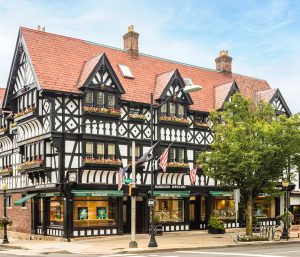 Just slightly younger than Hinkson’s is
Just slightly younger than Hinkson’s is  “One of my favorite things is when I’m in the store and I meet someone who says, ‘My dad bought his engagement ring from your grandfather and now there’s not even a question I was coming here to buy mine from you.’ That level of community support, where people say we are not even going to think about other stores or online, we support local, and we support the businesses that are in our community. That happens every day and it’s amazing,” recalls Siegel.
“One of my favorite things is when I’m in the store and I meet someone who says, ‘My dad bought his engagement ring from your grandfather and now there’s not even a question I was coming here to buy mine from you.’ That level of community support, where people say we are not even going to think about other stores or online, we support local, and we support the businesses that are in our community. That happens every day and it’s amazing,” recalls Siegel. Less than half a mile north on Nassau Street sits
Less than half a mile north on Nassau Street sits  “I think the heart of it is having good 2-way communication. It’s really important to have realistic expectations about what is happening on the part of businesses, but for the municipality it’s also important to understand the effect all these projects are having and trying to mitigate downside to greatest extent possible,” explains Isaac Kremer, Executive Director of the new
“I think the heart of it is having good 2-way communication. It’s really important to have realistic expectations about what is happening on the part of businesses, but for the municipality it’s also important to understand the effect all these projects are having and trying to mitigate downside to greatest extent possible,” explains Isaac Kremer, Executive Director of the new  Hinkson’s, for example, has hit the proverbial jackpot when it comes to things that have made business quite difficult – the pandemic shift from office environments to work-from-home, the on-and-off closing of the entrance to Spring Street due to the Witherspoon Street construction and the competition of big box stores and online shopping have created enormous hurdles for its survival. To keep afloat, both co-owners now also work other fulltime jobs. To stay relevant, the business model has shifted to include an online presence, delivery, shipping and printing. If one comes in person, they will still find unique stationary items like high end paper, journals and fountain pens.
Hinkson’s, for example, has hit the proverbial jackpot when it comes to things that have made business quite difficult – the pandemic shift from office environments to work-from-home, the on-and-off closing of the entrance to Spring Street due to the Witherspoon Street construction and the competition of big box stores and online shopping have created enormous hurdles for its survival. To keep afloat, both co-owners now also work other fulltime jobs. To stay relevant, the business model has shifted to include an online presence, delivery, shipping and printing. If one comes in person, they will still find unique stationary items like high end paper, journals and fountain pens. To differentiate itself from other Princeton restaurants and invite people to come try it, Ficus decided to not only open as a restaurant but an art gallery as well. It aims to welcome people with good food at an affordable price, but also to showcase art from local artists. The upstairs, upscale dining area is surrounded by artworks from established artists, while the 1st floor, causal café, displays works from young artists, just starting out.
To differentiate itself from other Princeton restaurants and invite people to come try it, Ficus decided to not only open as a restaurant but an art gallery as well. It aims to welcome people with good food at an affordable price, but also to showcase art from local artists. The upstairs, upscale dining area is surrounded by artworks from established artists, while the 1st floor, causal café, displays works from young artists, just starting out. When the Weshner’s opted to open Delizioso, they chose its location because they felt the neighborhood was calling for their type of eatery. Nothing else on those blocks offers Italian foods, homemade, made to order and using fresh, quality ingredients, so the customers are buying it. They’re also loving the genuine joy of serving them that emanates from Lynn Weshner when they stop in.
When the Weshner’s opted to open Delizioso, they chose its location because they felt the neighborhood was calling for their type of eatery. Nothing else on those blocks offers Italian foods, homemade, made to order and using fresh, quality ingredients, so the customers are buying it. They’re also loving the genuine joy of serving them that emanates from Lynn Weshner when they stop in. “The pendulum swings a lot but 10, 15, 20 years ago when online shopping started becoming a thing and big box retailers became more frequent, the pendulum swung too far. I think people realized pretty quickly there’s a personalized aspect missing,” Siegel recalls. “We have an important online business and we’re happy to serve our clients wherever they need to be served, but the thing that’s really great about working with a local, trusted retailer is that person is going to know you and know what you’re needs are and be able to call you before your anniversary, or know your kids is graduating, and probably sees you out to dinner. I think that’s what people are looking for when they make the decision to go out to a store.”
“The pendulum swings a lot but 10, 15, 20 years ago when online shopping started becoming a thing and big box retailers became more frequent, the pendulum swung too far. I think people realized pretty quickly there’s a personalized aspect missing,” Siegel recalls. “We have an important online business and we’re happy to serve our clients wherever they need to be served, but the thing that’s really great about working with a local, trusted retailer is that person is going to know you and know what you’re needs are and be able to call you before your anniversary, or know your kids is graduating, and probably sees you out to dinner. I think that’s what people are looking for when they make the decision to go out to a store.” Princeton, located approximately an hour from either New York City or Philadelphia, makes access to art pretty amazing. You can travel to places including the Met, MOMA or Whitney in NYC or Philadelphia Museum of Art or the Barnes Foundation in Philly. But sometimes, just traveling to a big city can make it prohibitive. You have to pay tolls, deal with traffic and of course, there’s parking. That’s why, whether you’re an artist or a connoisseur, it’s fortunate there are many artistic opportunities available that provide big-city offerings, an easy outing away. To view gallery exhibitions, get hands on with some paints and colors or to purchase a new special piece, you don’t have to travel too far.
Princeton, located approximately an hour from either New York City or Philadelphia, makes access to art pretty amazing. You can travel to places including the Met, MOMA or Whitney in NYC or Philadelphia Museum of Art or the Barnes Foundation in Philly. But sometimes, just traveling to a big city can make it prohibitive. You have to pay tolls, deal with traffic and of course, there’s parking. That’s why, whether you’re an artist or a connoisseur, it’s fortunate there are many artistic opportunities available that provide big-city offerings, an easy outing away. To view gallery exhibitions, get hands on with some paints and colors or to purchase a new special piece, you don’t have to travel too far.
 Whether you’re a professional artist or just like to dabble, if you want to simply stroll and look at art or want a chance to purchase some local art for your home, there are opportunities at ArtWorks. You can take a class, participate in a public art project, have your own work included in a planned exhibition or even have your own personal show hosted in their space. Building and developing community through the arts is the goal of this nonprofit, through exposure of artists’ works as well as exposure to non-artists of the creativity and art itself.
Whether you’re a professional artist or just like to dabble, if you want to simply stroll and look at art or want a chance to purchase some local art for your home, there are opportunities at ArtWorks. You can take a class, participate in a public art project, have your own work included in a planned exhibition or even have your own personal show hosted in their space. Building and developing community through the arts is the goal of this nonprofit, through exposure of artists’ works as well as exposure to non-artists of the creativity and art itself. Another 100 artists now have their work on display at
Another 100 artists now have their work on display at 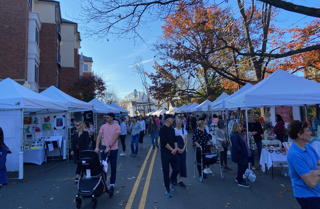 Since its founding in 1967, Arts Council of Princeton has aimed to fulfill its belief that the arts play an integral role in a healthy society and strong quality of life. Like Artworks, the Arts Council has created public displays of art around the community, such as the LOVE mural at Princeton Shopping Center and the Parklet built outside of
Since its founding in 1967, Arts Council of Princeton has aimed to fulfill its belief that the arts play an integral role in a healthy society and strong quality of life. Like Artworks, the Arts Council has created public displays of art around the community, such as the LOVE mural at Princeton Shopping Center and the Parklet built outside of 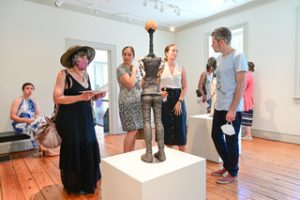 “Our two temporary gallery spaces are designed to balance each other in presenting a range of exhibitions exploring some of the most dynamic aspects of contemporary artistic practice. The scale of Art on Hulfish allows us to be present both thematic and single-artist exhibitions, at the level of either group exhibitions or single artist surveys,” says James Steward, Nancy A. Nasher-David J. Haemisegger, Class of 1976, Director of Princeton University Art Museum. “By contrast, the intimate nature of the gallery spaces in historic Bainbridge House is better suited to single-artist projects; during these years of construction, we feel it’s most impactful to focus these primarily on early-career artists, some of them receiving their first museum exhibitions.”
“Our two temporary gallery spaces are designed to balance each other in presenting a range of exhibitions exploring some of the most dynamic aspects of contemporary artistic practice. The scale of Art on Hulfish allows us to be present both thematic and single-artist exhibitions, at the level of either group exhibitions or single artist surveys,” says James Steward, Nancy A. Nasher-David J. Haemisegger, Class of 1976, Director of Princeton University Art Museum. “By contrast, the intimate nature of the gallery spaces in historic Bainbridge House is better suited to single-artist projects; during these years of construction, we feel it’s most impactful to focus these primarily on early-career artists, some of them receiving their first museum exhibitions.”
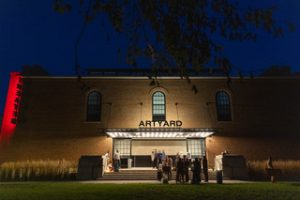

 Seldom in life is everything cut and dry. Life is often more of a balancing act. Trying to pit wants vs. needs, help vs. harm, others vs. yourself. I could go on, but I think you get the point. Especially after last week’s elections, which saw some voting in an effort to get what they want while others were voting to prevent what they don’t want.
Seldom in life is everything cut and dry. Life is often more of a balancing act. Trying to pit wants vs. needs, help vs. harm, others vs. yourself. I could go on, but I think you get the point. Especially after last week’s elections, which saw some voting in an effort to get what they want while others were voting to prevent what they don’t want. When you look forward to your Thanksgiving feast, are you dreaming of the turkey or the sides? Do you get through the meal for the dessert or are you savoring every bite you eat? When planning a Turkey-Day menu, there are a lot of things to consider, ensuring your guests leave full and satisfied. What is the right balance? While most would agree on some basic needs, there are some nuances.
When you look forward to your Thanksgiving feast, are you dreaming of the turkey or the sides? Do you get through the meal for the dessert or are you savoring every bite you eat? When planning a Turkey-Day menu, there are a lot of things to consider, ensuring your guests leave full and satisfied. What is the right balance? While most would agree on some basic needs, there are some nuances. If you are planning a full vegan or vegetarian meal, the sides become even more important. Sweet potato souffle, mashed potatoes, gravy, stuffing (cornbread or sausage were stated favorites), brussel sprouts, green bean casserole and cranberry sauce topped people’s preferences. Some eat their foods separately, and for others it’s the “smoosh” of eating it all together that makes it great! What makes these sides even more special? Several that took our survey said they are once-a-year treats.
If you are planning a full vegan or vegetarian meal, the sides become even more important. Sweet potato souffle, mashed potatoes, gravy, stuffing (cornbread or sausage were stated favorites), brussel sprouts, green bean casserole and cranberry sauce topped people’s preferences. Some eat their foods separately, and for others it’s the “smoosh” of eating it all together that makes it great! What makes these sides even more special? Several that took our survey said they are once-a-year treats. “Offering both Italian and American sides, starters… antipasti, zuppa, salads, cheese, salumi,” Raoul Momo says of his family’s meal. As co-owner of
“Offering both Italian and American sides, starters… antipasti, zuppa, salads, cheese, salumi,” Raoul Momo says of his family’s meal. As co-owner of  Personal preference of the chef and family traditions tend to dictate what will be served, but there are some general guidelines, shares Shelley Wiseman, chef, author and owner of
Personal preference of the chef and family traditions tend to dictate what will be served, but there are some general guidelines, shares Shelley Wiseman, chef, author and owner of  Whether you buy it cooked or make it yourself, be sure to serve both white and dark meat, to suit everyone’s needs. And don’t forget to save the carcass (some guests find that to be their favorite part!). Guidelines suggest 1-2 pounds of turkey per guest (don’t worry about cooking one too large, as the leftovers are even better). Wiseman offers some guidance on how to cook your turkey to perfection:
Whether you buy it cooked or make it yourself, be sure to serve both white and dark meat, to suit everyone’s needs. And don’t forget to save the carcass (some guests find that to be their favorite part!). Guidelines suggest 1-2 pounds of turkey per guest (don’t worry about cooking one too large, as the leftovers are even better). Wiseman offers some guidance on how to cook your turkey to perfection: “All diets are off that day,” Angelakis states, as Olive’s prepares many sweets for Thanksgiving. “No one forgets about dessert. We do a lot of dessert. We sell traditional pies and also do lemon merengue, chocolate mousse pie, other specialty desserts. By far the most popular is pumpkin, it’s the favorite.”
“All diets are off that day,” Angelakis states, as Olive’s prepares many sweets for Thanksgiving. “No one forgets about dessert. We do a lot of dessert. We sell traditional pies and also do lemon merengue, chocolate mousse pie, other specialty desserts. By far the most popular is pumpkin, it’s the favorite.”
 According to the
According to the  “It’s more than just land use because it is tied into so many things,” shares Justin Lesko, Princeton’s Acting Planning Director/Senior Planner. “Even if you’re not interested in planning this legal document, you still can be interested in taking part and contributing to it because it touches upon open space, recreation, how we get around, cars, e-bikes, mass transit, historic presentation, green building and sustainability, etc. It’s not just something I am going to type up that is going to sit on a shelf and never gets looked at.”
“It’s more than just land use because it is tied into so many things,” shares Justin Lesko, Princeton’s Acting Planning Director/Senior Planner. “Even if you’re not interested in planning this legal document, you still can be interested in taking part and contributing to it because it touches upon open space, recreation, how we get around, cars, e-bikes, mass transit, historic presentation, green building and sustainability, etc. It’s not just something I am going to type up that is going to sit on a shelf and never gets looked at.” Unfortunately, the Princeton government has been utilizing an outdated “map” for far too many years. Though there were some updates made since 1996, the essential community input remains and must be reworked to address what is needed and wanted today.
Unfortunately, the Princeton government has been utilizing an outdated “map” for far too many years. Though there were some updates made since 1996, the essential community input remains and must be reworked to address what is needed and wanted today. So, who is contributing most to the direction of the new Master Plan? You! Every effort is being made to ensure that anyone that wants to share their thoughts, concerns and desires, has a chance to do so. In addition to the opportunity to attend Steering Committee meetings, locals have and will be invited to take part in community surveys and are requested at open houses (the first of which will be at Princeton Public Library November 30th from 4-7pm).
So, who is contributing most to the direction of the new Master Plan? You! Every effort is being made to ensure that anyone that wants to share their thoughts, concerns and desires, has a chance to do so. In addition to the opportunity to attend Steering Committee meetings, locals have and will be invited to take part in community surveys and are requested at open houses (the first of which will be at Princeton Public Library November 30th from 4-7pm).
 “Some think of it as a college town, which it is, but in a very different way than, say, a Big 10 town. For others, it is a bedroom community for commuters to New York, which it is, but not the way Westchester County or Greenwich, Connecticut, are. Some see it as a small city, which, again, it sort of is and sort of isn’t. Others, particularly some of the people who grew up here or who have been here longer than I have, idealize it as small town, one that was certainly experienced differently if you grew up in Witherspoon Jackson or Jugtown, as opposed to the Western Section. The challenge of this Master Plan is to forge consensus on a way forward out of these multiple and distinctive views of what Princeton is and should become,” Quinn points out.
“Some think of it as a college town, which it is, but in a very different way than, say, a Big 10 town. For others, it is a bedroom community for commuters to New York, which it is, but not the way Westchester County or Greenwich, Connecticut, are. Some see it as a small city, which, again, it sort of is and sort of isn’t. Others, particularly some of the people who grew up here or who have been here longer than I have, idealize it as small town, one that was certainly experienced differently if you grew up in Witherspoon Jackson or Jugtown, as opposed to the Western Section. The challenge of this Master Plan is to forge consensus on a way forward out of these multiple and distinctive views of what Princeton is and should become,” Quinn points out.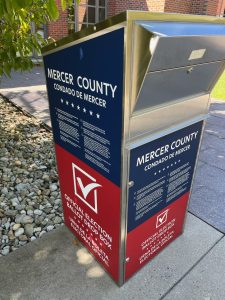 I got back into local journalism a few years ago, frustrated by the fact that there was nowhere to learn about the many local candidates that would appear on my ballot. Sure, I might have seen an ad or an editorial, but I wasn’t finding any information about a candidate’s experience, plans for office, and no unsolicited information to help sway my vote. So, I wrote an article about some. Now, I dedicate every October issue to informing you as a voter. This issue of Princeton Perspectives marks the 3rd annual elections issue.
I got back into local journalism a few years ago, frustrated by the fact that there was nowhere to learn about the many local candidates that would appear on my ballot. Sure, I might have seen an ad or an editorial, but I wasn’t finding any information about a candidate’s experience, plans for office, and no unsolicited information to help sway my vote. So, I wrote an article about some. Now, I dedicate every October issue to informing you as a voter. This issue of Princeton Perspectives marks the 3rd annual elections issue.